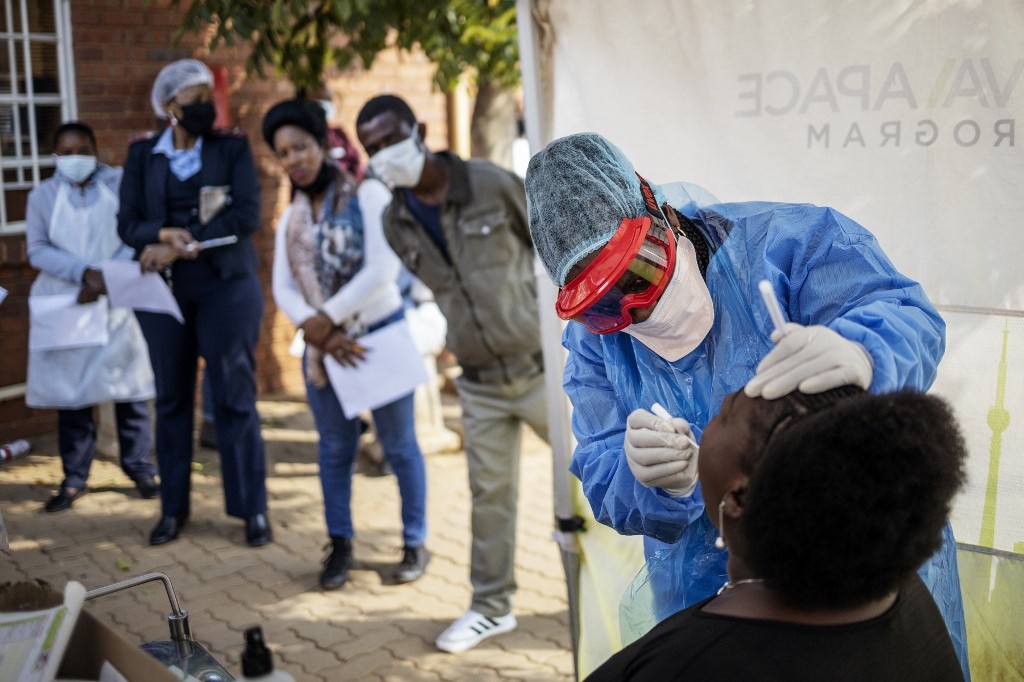


A nurse performs a swab test for Covid-19.
- The ban on alcohol sales is expected to reduce trauma admissions by 50 000 cases over eight weeks.
- This should save R1.3 billion and enable the treatment of about 18 000 Covid-19 patients in general wards or about 13 000 in ICU wards.
- Other measures than a ban would have been harder to implement and not as successful, Parliament was told on Wednesday.
Eight weeks of an alcohol ban would save the country R1.3 billion and would enable the treatment of about 18 000 Covid-19 patients in general wards or about 13 000 in ICU wards, modelling suggests.
Professor Charles Parry of the South African Medical Research Council’s (SAMRC) Alcohol, Tobacco & Other Drug Research Unit briefed the Portfolio Committee on Health on the impact of alcohol on South Africa’s health services.
Introducing Parry to the committee, SAMRC president Dr Glenda Gray described Parry as a “world expert” on alcohol whose work is driving policy on an international level.
READ | Covid-19: 500 infections in SA every hour, says Dlamini-Zuma
The work presented to the committee stemmed from two questions raised by the Ministerial Advisory Committee (MAC), was presented to the National Coronavirus Command Council (NCCC) and informed the decision to once again promulgate a lockdown regulation banning the sale of alcohol.
The two questions the MAC wanted to be answered, is: What would the effect of re-imposing a ban on liquor sales during Level 3 lockdown on trauma-related hospital visits and admissions be? What would the effect of placing tighter restrictions on alcohol access as opposed to a ban on liquor sales in terms of reducing the burden on the public health care system and trauma admissions be?
Overcrowding
Parry said trauma patients presenting to a healthcare facility and not requiring admission, contributes to overcrowding, therefore increasing the risk of transmission of Covid-19 between patients and staff in the emergency room.
Furthermore, trauma patients requiring surgery consume resources such as theatre time, and skilled staff. Such staff can potentially be deployed to other areas of need in the hospital.
Patients with multiple injuries frequently require prolonged hospitalisation and extended rehabilitation often exceeding four weeks.
Parry said during lockdown Level 3, when alcohol sales were allowed, they saw 80% of the level of trauma admissions of pre-lockdown levels.
READ MORE | Booze ban: Winde warns of catastrophic unemployment pandemic
During lockdown Level 5, 50% of trauma admissions were alcohol-related.
Parry said a liquor ban wouldn’t cause a drastic reduction in alcohol-related trauma at once. As there would still be a lot of liquor in circulation, they expect a reduction of 20% in the first week.
“You’re never going to get all of it to go away,” he said.
He said that over eight weeks, a ban on liquor sales could potentially save the system from having to deal with about 50 000 trauma cases.
“That is only 18% of all trauma submissions, or 36% of all alcohol-related trauma,” he said.
“But even that, we believe, will make an impact.”
He said over eight weeks, the liquor ban would reduce alcohol-related trauma cases by 36% and all trauma cases by 18%.
Other action ineffective
He said the modelling suggests that the 50 000 fewer trauma cases would lead to a saving of R1.3 billion, and would allow for almost 18 000 Covid-19 patients to be treated in general wards or about 13 000 in ICU wards, or a combination thereof.
He said measures other than banning liquor sales – such as limits on the availability, stronger measures against drunk driving, limits on advertising and packaging and treatment and interventions – would be harder to implement and would not have been as successful.
SEE | Thieves hit Cape Town bottle store and clear out whiskey stock
He said his personal opinion was that these measures should have been implemented at the start of Level three.
The presentation was generally well-received by the committee, who appears to have an appetite for establishing a “new normal” post-pandemic with regards to restricted alcohol consumption.
“It is not every South African who drinks, but those who do, they just drink too much,” said committee chairperson Sibongiseni Dhlomo.
Gray said over the past two decades South Africa haven’t paid much attention to alcohol.
She said there should be a national alcohol policy and an endeavour to promote responsible drinking.

